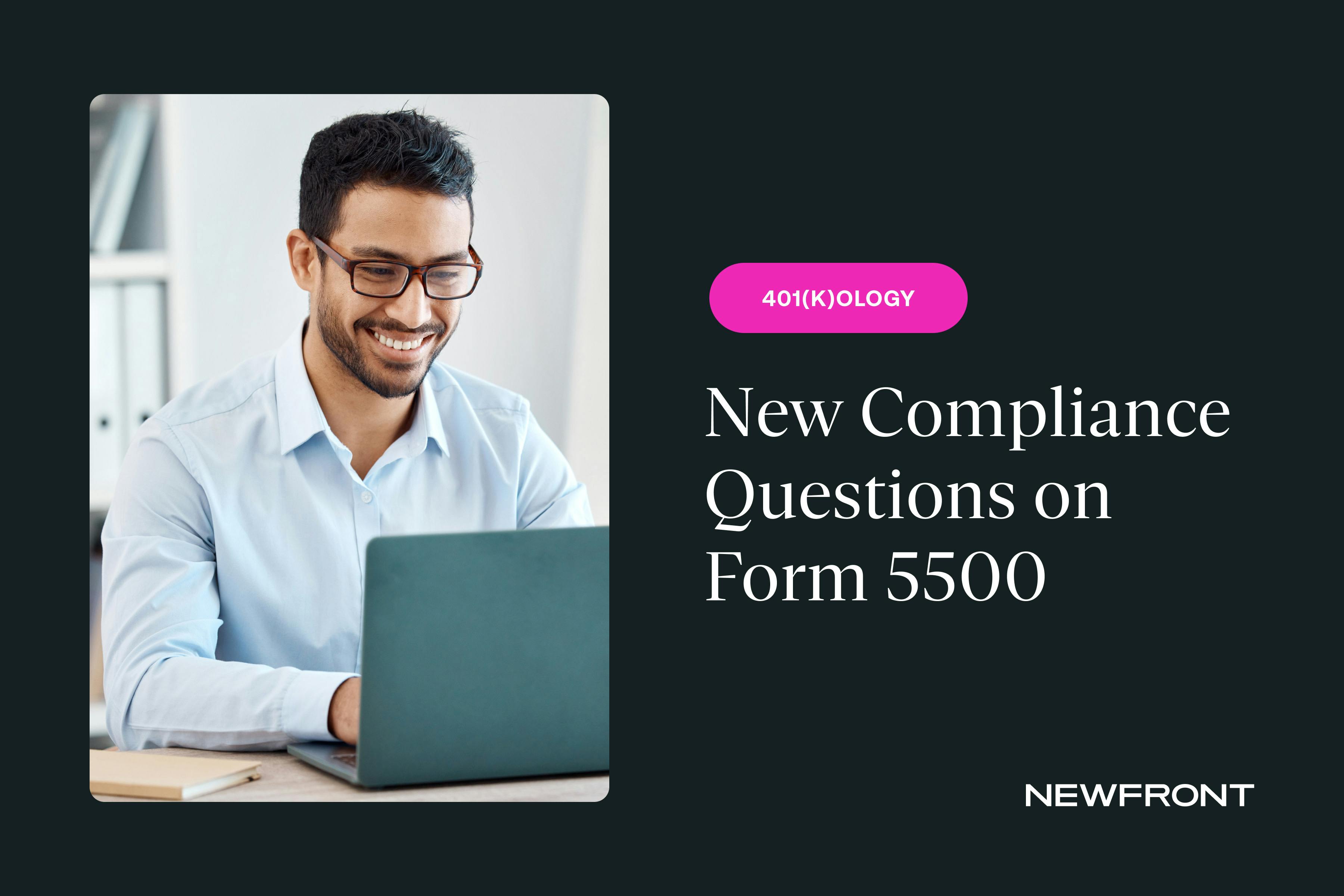401(k)ology – New Compliance Questions on Form 5500
By Joni L. Jennings, CPC, CPFA®, NQPC™ | Published March 18, 2024

The 2023 Form 5500 series (filed in 2024) introduces three new compliance questions on Schedule R. These new *interesting* compliance questions may be used by the regulatory agencies in the review and examination selection process. It is critically important to understand what these new questions are asking and how to accurately complete the schedules for your plan.
The Form 5500, an annual informational filing required for most ERISA plans, is used for compliance, research, and disclosure by three governmental agencies – the Department of Labor (DOL), the Internal Revenue Service (IRS) and the Pension Benefit Guarantee Corporation (PBGC). If your company has never sponsored a defined benefit pension plan, then you may not be familiar with the PBGC, which is the agency that insures benefits owed participants and retirees covered by private sector pension plans. The three regulatory agencies use the information reported on the Form 5500 to select plans for examination and to gauge overall trends in retirement plans.
The new IRS compliance questions are specific to the satisfaction of coverage and nondiscrimination requirements, and the timely adoption of required updates to the plan’s legal documents. Let’s dive in and identify if these compliance items are relative to your retirement plan.
Compliance Questions
The 2023 Schedule R contains three new compliance questions (Part VII) that must be completed by both small plan and large plan filers. Schedule R is not filed by small plan filers that are eligible to use Form 5500-SF (Short Form) or Form 5500-EZ (One Participant). However, the same compliance questions are included on Form 5500-SF (Part VIII). For one participant plans filing on Form 5500-EZ, the only applicable compliance question relates to the pre-approved plan document (item 3 below) and is included in Part V, Item 12.
Schedule R (Item 21a) Coverage and Nondiscrimination
Question: Does the plan satisfy the coverage and nondiscrimination tests of Code sections 410(b) and 401(a)(4) by combining this plan with any other plans under the permissive aggregation rules? (“Yes” or “No” Checkbox)
Code Sections 410(b) and 401(a)(4) are the IRS regulations that govern whether enough Non-Highly Compensated Employees are covered by the plan (coverage) and whether the benefits provided under the plan(s) are provided on a nondiscriminatory basis. If there are no other retirement plans in existence, the answer is an easy “No” because technically this question does not apply. Would have been nice to get an “N/A” box here!
However, if there are multiple retirement plans maintained by the same employer or related employers treated as a single employer due to Controlled Group or Affiliated Service Group status (401(k)ology – Related Employers), permissive aggregation may apply.
Example 1 – Employer A is not related to any other entity, but sponsors both a 401(k) plan and a cash balance plan. In many cases, those plans are aggregated for testing the employer provided benefits and the answer to 21a would be “Yes”.
Example 2 – Entities A, B & C are related employers (treated as a single employer for qualified retirement plan purposes), and each entity sponsors a separate 401(k) plan. If any (or all) of the 401(k) plans are aggregated to satisfy coverage and/or nondiscrimination in benefits provided, the aggregated plans would each respond with “Yes”.
Permissive aggregation only applies when two or more separate plans are treated as a single plan for the purpose of demonstrating compliance with coverage and nondiscrimination. Permissive aggregation is applicable to related employers treated as a single employer and to multiple plans sponsored by the same employer. Other rules also apply. For example, the plans must have the same plan year and utilize the same testing methods to be permissively aggregated.
Editorial comment: What is the purpose of this particular question? The IRS is likely focusing on combination plans (401(k) plan paired with a cash balance plan) and multiple 401(k) plans that are part of the same related employer group. It may target those plans for future examination to demonstrate compliance with the coverage and nondiscrimination requirements.Schedule R (Item 21b) – 401(k) Testing Method
Question: If this is a Code section 401(k) plan, check all boxes that apply to indicate how the plan is intended to satisfy the nondiscrimination requirements for employee deferrals and employer matching contributions (as applicable) under Code sections 401(k)(3) and 401(m)(2). (Checkboxes for “Design-based safe harbor method,” “‘Prior year’ ADP test,” “‘Current year’ ADP test,” and “N/A”)
All 401(k) plans are required to satisfy certain nondiscrimination rules on both deferrals and/or matching contributions. Plans may either be tested each year to demonstrate that the deferrals and match were not discriminatory or may elect to automatically satisfy the testing by making required employer contributions to the plan, known as safe harbor 401(k) plans (401(k)ology – Safe Harbor 401(k) Plans).
Apparently, the IRS would like to know how plans are complying with the annual nondiscrimination testing requirements. Safe harbor 401(k) plans (including Qualified Automatic Contribution Arrangements) will select the “design based safe harbor method” regardless of the type of safe harbor 401(k) plan.
Tested plans must indicate if the “Prior Year” or the “Current Year” method for the Average Deferral Percentage Test (ADP) was used. Without going heavy into the details, this identifies if the average deferral rate used in the test for the plan year for the non-highly compensated employees was based on data for the year prior to the year of the test (e.g., 2022 NHCE rates used in the 2023 ADP Test) or the same year as the test that includes the Highly Compensated Employees (e.g., 2023 NHCE rates used in the 2023 ADP Test).
If the plan does not have 401(k) plan provisions, this question will not be applicable (N/A).Schedule R (Item 22) – Pre-Approved Plans/Opinion Letter
Question: If the plan sponsor is an adopter of a pre-approved plan that received a favorable IRS Opinion Letter, enter the date of the Opinion Letter ___/___/_____ (MM/DD/YYYY) and the Opinion Letter serial number__________.
The vast majority of all retirement plans are supported by third-party administrative firms or large recordkeepers and service providers, all of which typically provide the plan sponsor with an adoption agreement and basic plan document that has been through the IRS approval process. The key is making sure that the plan sponsors have complied with the mandatory restatement requirements, not at the provider level but at the individual plan sponsor level. The last required restatement period was known as “Cycle 3” and required defined contribution plan sponsors (other than 403(b) plans) to execute the updated plan documents by July 31, 2022. If a plan is established after that date, the pre-approved plan documents will be compliant with the Cycle 3 version.
Essential to answering this question is matching the adoption agreement version with the correct IRS Opinion Letter. Adoption agreements come in a few varieties, and all are tied to the same basic plan document. For example, the adoption agreement may be for a standardized profit-sharing plan, a non-standardized profit-sharing plan, a standardized 401(k) plan or a non-standardized 401(k) plan. Each of those four adoption agreement types will have their own IRS Opinion Letter with a specific serial number. Confirm with your document provider which one is correct before completing this item.
Some plans may use attorney-drafted plan documents. Although this is rare in the overall retirement plan landscape, there are some plan sponsors that will leave this item blank. Again, would have been helpful to have another option because not answering this question may flag the plan for review by the IRS.
Why call out these new compliance questions as *interesting*? The short answer is that it is highly likely that the IRS will use the responses to these questions to target plans for examination. IRS announced on June 3, 2022 that it was piloting a new 90-day pre-examination compliance program that will reduce a plan sponsor’s time and burden in the examination process by encouraging self-correction of operational defects. On February 7, 2024, IRS announced that phase two of that pilot program is in full swing and, should your plan receive a letter from the IRS, the most important thing is to respond within the 90-day pre-examination period.
Conclusion
Filing an accurate Form 5500 is one of the most important requirements for maintaining a qualified retirement plan. Many plan sponsors use third party service providers to assist with the completion and submission of the annual Form 5500 filing requirement. However, it is ultimately the plan sponsor’s responsibility to review the filing before submission. Once filed, the regulatory agencies will review the filing and may target your plan for an examination if red flags are detected. Ask your Form 5500 preparer to review the form with you before submission to prevent an unwanted letter from the IRS or DOL.
Newfront’s Retirement Services team understands the complexity of maintaining a qualified retirement plan. Let us know if we can help you maintain a healthy retirement plan or assist you in establishing a new one.
Email us at 401kHelp@newfront.com
Helpful Links:
Newfront Retirement Services, Inc. is an investment adviser registered with the U.S. Securities and Exchange Commission. Registration as an investment adviser does not imply any level of skill or training, and does not constitute an endorsement by the SEC. For a copy of Newfront Retirement Services disclosure brochure, which includes a description of the firm’s services and fees, please access www.investor.gov or click HERE for the disclosures on our website.

Joni L. Jennings, CPC, CPFA®, NQPC™
Chief Compliance Officer, Newfront Retirement Services, Inc.
Joni Jennings, CPC, CPFA®, NQPC™ is Newfront Retirement Services, Inc. Chief Compliance Officer. Her 30 years of ERISA compliance experience expands value to sponsors of qualified retirement plans by offering compliance support to our team of advisors and valued clients. She specializes in IRS/DOL plan corrections for 401(k) plans, plan documents and plan design.


